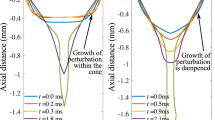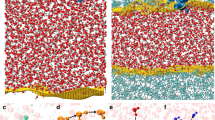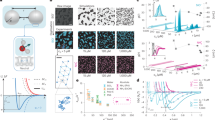Abstract
THE explanation of the flotation processes with the aid of the cataphoretic and electroendosmotic potentials has failed completely. These potentials play an important part at a distance from the geometrical interface of the phase only.1 There are, however, suggestions in the literature2 that ideal chemical electrodes should have a positive electrostatic potential in water and the dielectrics a negative one. This suggestion has important consequences. Emulsions of dielectrics in water will wet unattackable electrodes immersed in water but not attackable electrodes which are coated with dielectric oxides (hydroxides) in water. The wetting must, however, reduce the positive charge of the unattackable electrode, and it is expected that the wetting will not take place on attackable electrodes coated with a dielectric hydroxide, as for example, zinc. This is actually observed.
This is a preview of subscription content, access via your institution
Access options
Subscribe to this journal
Receive 51 print issues and online access
$199.00 per year
only $3.90 per issue
Buy this article
- Purchase on Springer Link
- Instant access to full article PDF
Prices may be subject to local taxes which are calculated during checkout
Similar content being viewed by others
References
Freundlich, H., Ettisch, G., Zeit. für phys. Chem., 116, 401–419; 1925.
Kamienski, B., Zeit. für phys. Chem., 138, 345; 1928: 145, 48: 1929: 147, 288; 1930: Przemyst chemiczny, 201; 1931.
Author information
Authors and Affiliations
Rights and permissions
About this article
Cite this article
KAMIENSKI, B. An Electrostatic Explanation of the Phenomenon of Flotation. Nature 129, 59–60 (1932). https://doi.org/10.1038/129059c0
Issue Date:
DOI: https://doi.org/10.1038/129059c0
Comments
By submitting a comment you agree to abide by our Terms and Community Guidelines. If you find something abusive or that does not comply with our terms or guidelines please flag it as inappropriate.



